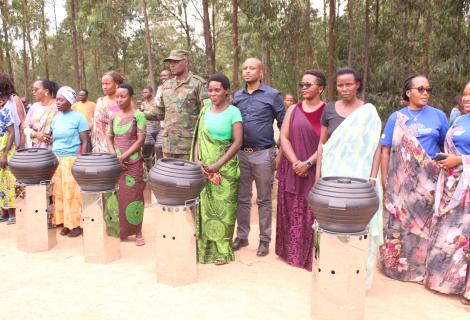ActionAid Rwanda Celebrated International Rural Women’s Day 2022

ActionAid Rwanda joined the rest of the World to Celebrate the International Rural Women’s Day 2022. This day was created in 1995 by Civil society organizations at the Fourth World Conference on Women in Beijing and was declared an official UN Day in 2007 by the UN General Assembly.
ActionAid Rwanda joined the rest of the World to Celebrate the International Rural Women’s Day 2022. This day was created in 1995 by Civil society organizations at the Fourth World Conference on Women in Beijing and was declared an official UN Day in 2007 by the UN General Assembly.
The set objectives of the Day include mobilizing relevant NGOs and grassroots women’s groups, organizations, networks, and international institutions, as well as the media, to commemorate the Day and celebrate Rural Women Leaders and their communities around the world. The second objective is raising awareness of rural women’s participation in the development process with a focus on their needs and rights, highlighting their contributions to sustainable development, household food security, safeguarding traditional knowledge, biodiversity, and peacebuilding and so much more. The third objective was sensitizing the public at large and lobbying governments on the crucial role rural women play in climate change management and to prioritize action for their support.
The theme for this year is “Rural Women Rise and Claim Your Basic Right to Sustainable Development” while the national theme is “Development of Rural Women, a Pillar of Rwanda’s Economy”.
ActionAid Rwanda works to empower rural women farmers in different ways and helps them to boost their incomes through sustainable agricultural practices, enhancing food security and social justice.
In line with promoting and strengthening resilient livelihoods, ActionAid prioritizes interventions for rural women smallholder farmers, strengthening their capacity to adapt climate change impacts for enhanced and sustainable food production systems through practicing agroecology, access to markets for their produce, and ensure sustainable use of natural resources
ActionAid also empowers rural women and girls to form social and economic collectives which include voluntary saving and loaning initiatives (VSLAs) and off-farm income generating activities to ensure rural women smallholder farmers thrive for financial independence hence be able to finance their collective business initiatives but also build the necessary capacity to quickly recover from any form of chocks.
In view to increasing the capacity of rural women smallholder farmers to practice agro-ecology, ActionAid Rwanda promotes and advocates for increased public financing for climate resilient sustainable to benefit rural women smallholder farmers livelihood initiatives through recognizing, reducing and redistributing the unequal workload of Unpaid Care Work to break the cycle of poverty and VAWG while at the same time increasing their capacity to engage in decision making processes at all levels.
ActionAid actively participated in the celebrations of the IRWD at the National Level event in Huye where it was represented by Ines Mwangavu, the Interim Executive Director of ActionAid Rwanda. ActionAid also participated in the celebrations of the event in its Local Rights Programmes where vulnerable rural women were provided with livestock and energy-saving cooking stoves to support them coming out poverty and reduce the burden of unpaid care work. The provided energy-saving cook stoves (Save80) were proven useful and popular among the women themselves because they are cheaper, easy to use and eco-friendly with use of less amount of firewood that contributes to environmental management.
ActionAid Rwanda reiterates its commitment to continue to parallelly work to addressing the Structural Causes of Violence Against Women and Girls and Secure Women’s Economic Justice and strengthening resilient livelihoods and secure climate justice ensuring that rural women smallholder farmers increase the capacity to meet their food nutrition requirements through practicing agroecology, accessing profitable markets and finance to enjoy their rights to sustainable and resilient livelihoods. This will ultimately be reached through increased women’s access and control over productive resources and participation in the public planning and budgeting processes while ensuring protection of women’s rights with the necessary preconditions that minimize all structures that have historically kept women disempowered and marginalized.